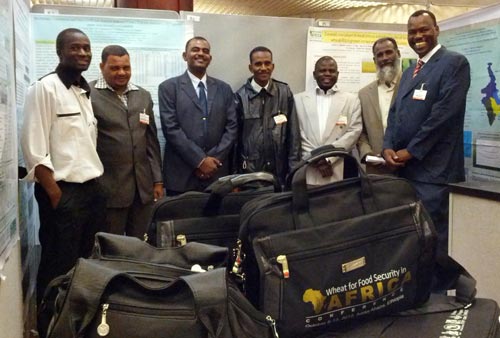It’s day one at Wheat for Food Security in Africa, and Cobus Le Roux has just finished outlining the production, constraints, market, and future of wheat in Southern Africa. This morning participants enjoyed keynote speeches from Kwadwo Asenso-Okyere (IFPRI), Nicole Mason (Michigan State University), and Bekele Shiferaw (CIMMYT).
One of the key issues raised was just how much of their precious little foreign expenditure African countries must spend on imports. In 2010, over 12.5 US$ billion was spent to import 32 million tons of wheat to Africa. Many of this morning’s speakers posed the question: “What if that money was spent on wheat research instead? How much money would it take to improve wheat and agronomy so that that import bill is reduced or even eliminated?”
Food security was a buzzword on everyone’s lips this morning. Food aid does not imply food security, merely that people have enough to eat at that moment. But what about next year? What happens then? And what if the countries who supplied food aid this year are unable to do so next year? According to Kwadwo, food security is a right, not a priviledge. And the economics makes sense too; a woman who does not get enough, nutritious food during pregnancy is likely to give birth to an underweight, undernourished baby. If this baby does not get healthy food on a regular basis, particularly in the first two years of childhood, it is more likely to grow up to be an underweight, undernourished adult. This underweight, undernourished adult will not be as strong, not as able to work, more likely to get ill. We need healthy, strong adults if we are to create productive, prosperous countries. Whilst the high food prices in 2007/08 and 2010/11 caused shockwaves around the world, they produced some small benefit in propelling food security to the forefront of the global agenda.
Producing more wheat could help African countries achieve food security. Everyone at the conference is in agreement that demand for wheat in Africa is increasing. Traditionally in Africa, wheat has been the food of the rich; but now that incomes are on the rise, wheat is being eaten also by the traditionally lower- and middle-classes. An increasingly urban population is demanding more processed food, requiring less preparation time; this food is generally wheat-based, such as bread. And whilst the price of wheat is on the rise, the increase has not been as dramatic as for some other staple crops, meaning that it is becoming an ever more attractive option for consumers.
“So,” asked Bekele, “There is obviously a big demand for wheat in Africa – what can we do about the supply?”
And that is the question we are here to answer, starting this afternoon with presentations on the current wheat situation in different parts of Africa and round-table discussions addressing many aspects of wheat production, constraints, and the value chain in Africa. This is not an opportunity for a jolly to Addis Ababa – the participants are here to do a job. We are here to influence and improve the future of wheat in Africa, and that is no small task.
Tomorrow there will be more specific discussions on the things currently constraining African wheat production: abiotic and biotic factors, wheat markets and seed systems, and wheat quality. You can follow all the action on twitter using #W4A, or check back here tomorrow for a full summary.

 Capacity development
Capacity development 
